OUR COMMON HISTORY: From the Baltic to the Pacific
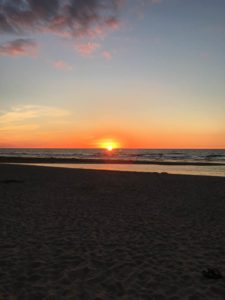 The second half of July is usually the hottest time of the year on the Latvian coast of the Gulf of Riga; at this time not only Rigans, but numerous tourists—mostly from former Soviet republics—make their way here, to the smooth and refreshing waters of the Baltic Sea, to the sunny and sandy beaches of Jurmala and Saulkrasti. Such is the Russian imperial tradition that has formed during the years of Soviet occupation—indeed, long before it; it has been established by Peter the Great, whose wife (and the first empress of Russia) was Catherine, nee Marta Skowrońska, a native of Latvia. This means that all Russian emperors and empresses, beginning with Elizabeth, Peter and Catherine’s daughter, were partly Latvians: half, quarter, and so on. Have you ever thought about this? Despite the unfortunate disconnect between modern-day Russians and Latvians, we really do have a common history.
The second half of July is usually the hottest time of the year on the Latvian coast of the Gulf of Riga; at this time not only Rigans, but numerous tourists—mostly from former Soviet republics—make their way here, to the smooth and refreshing waters of the Baltic Sea, to the sunny and sandy beaches of Jurmala and Saulkrasti. Such is the Russian imperial tradition that has formed during the years of Soviet occupation—indeed, long before it; it has been established by Peter the Great, whose wife (and the first empress of Russia) was Catherine, nee Marta Skowrońska, a native of Latvia. This means that all Russian emperors and empresses, beginning with Elizabeth, Peter and Catherine’s daughter, were partly Latvians: half, quarter, and so on. Have you ever thought about this? Despite the unfortunate disconnect between modern-day Russians and Latvians, we really do have a common history.
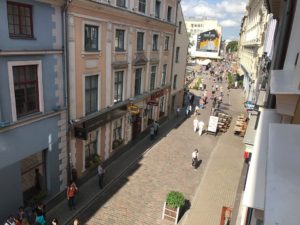
It was about this that lectures, seminars, and student work were conducted in Riga between July 17 and July 28, 2017, within the summer history school “From the Baltic to the Pacific: A Common History of Northern Eurasia” that was organized by KRES Poliskola and the editors of Ab Imperio history journal. Classes were held in the heart of Old Riga, on Kaļķu iela, at the welcoming Baltic Center for Educational and Academic Development. Lectures and seminars were given by world-class history teachers; the amazing Marina Mogilner, Ilya Gerasimov, and Alexander Semenov. Their worthy students included young researchers from Russia, Belarus, Germany, the United States, and, of course, from Riga itself.
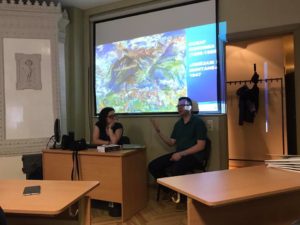
The course of study prepared by Marina Mogilner and Ilya Gerasimov specifically for this summer school, according to the authors themselves*, requires “…abandoning not only stereotypes about the past, historical teleology, and narrow national limits, but also the very analytical language inherited from the 19th century, which we still use to talk about the history of the region…”, and this, in their view, is the most difficult aspect of the course. The students have mastered this task, and shifting to a new language of thought was for them sometimes easier than even for the teachers. Thus, Timur Mitrofanov, a historian at law from Kazan, noted that “rethinking the ‘scheme of Russian history’; a new perception and understanding of the processes occurring in the region” was for him the most “unexpected” experience. Even the teachers did not expect such a strong interest from young specialists to the course, and such involvement in the learning process.
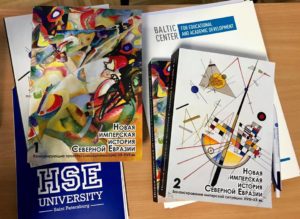 All in all, it would not be an exaggeration to say that the school was a success: it was interesting, educational, and lively. In the end, two weeks of daily studies turned out to be insufficient; everyone wanted to go on for longer. The participants showed a strong interest in the object of studies, and a desire to discuss it with like-minded people and to look from a new angle on historical facts that seemed to be long-known. By honestly discussing the past it is easier to understand the present and even look into the future; to try to resolve the modern-day problems facing the region’s inhabitants based on a correct understanding of historical processes. As one of the school’s participants, St. Petersburg Ph.D. candidate Alexander Korobeinikov noted, “it was clear that the students strove to take a closer look at particular cases, to find examples confirming or refuting certain statements, to discuss the current state of affairs with a focus, optics, and conceptual mechanism of the course.”
All in all, it would not be an exaggeration to say that the school was a success: it was interesting, educational, and lively. In the end, two weeks of daily studies turned out to be insufficient; everyone wanted to go on for longer. The participants showed a strong interest in the object of studies, and a desire to discuss it with like-minded people and to look from a new angle on historical facts that seemed to be long-known. By honestly discussing the past it is easier to understand the present and even look into the future; to try to resolve the modern-day problems facing the region’s inhabitants based on a correct understanding of historical processes. As one of the school’s participants, St. Petersburg Ph.D. candidate Alexander Korobeinikov noted, “it was clear that the students strove to take a closer look at particular cases, to find examples confirming or refuting certain statements, to discuss the current state of affairs with a focus, optics, and conceptual mechanism of the course.”
Unfortunately, there was not enough time, as usual. Anton Levitsky, a Ph.D. candidate from Munich, stated that “…it seems that you cannot go wild on a two-week program, and there will probably never be enough [time].” The teachers Ilya Gerasimov and Marina Mogilner also noted the inevitable need to scale down the material.
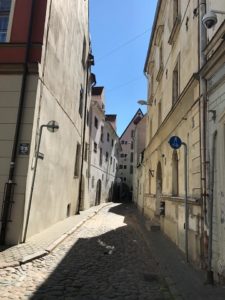 The team of KRES Poliskola—above all, the director of its Riga office, Jolanta Runce, and its executive director, Pavel Ivlev—did everything to organize the students’ stay in Riga in the best possible manner. All those who needed it received help with entry visas and lodging near the location of the school. Every student received a copy of the just-published two-volume history book, A New Imperial History of Northern Eurasia, authored by the editors of Ab Imperio. It is important to note that the authors of this book—the teachers of the summer school—do not claim to have articulated the ultimate truth. Their aim was to stimulate interest in history; to talk about it in a new language; and to do it in an accessible and engaging way—and this was achieved. In the end, there was not a single student at the school who did not want to continue the course.
The team of KRES Poliskola—above all, the director of its Riga office, Jolanta Runce, and its executive director, Pavel Ivlev—did everything to organize the students’ stay in Riga in the best possible manner. All those who needed it received help with entry visas and lodging near the location of the school. Every student received a copy of the just-published two-volume history book, A New Imperial History of Northern Eurasia, authored by the editors of Ab Imperio. It is important to note that the authors of this book—the teachers of the summer school—do not claim to have articulated the ultimate truth. Their aim was to stimulate interest in history; to talk about it in a new language; and to do it in an accessible and engaging way—and this was achieved. In the end, there was not a single student at the school who did not want to continue the course.
A big thank you to the teachers and students of the school. It was an enjoyable acquaintance, and we will definitely meet again.
*Comments from the school’s teachers and students can be accessed here (Russian)




